|
|
|
Sort Order |
|
|
|
Items / Page
|
|
|
|
|
|
|
| Srl | Item |
| 1 |
ID:
136454
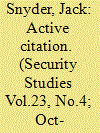

|
|
|
|
|
| Summary/Abstract |
Andrew Moravcsik makes a persuasive case that rigorously executed qualitative methods have a distinctive and indispensable role to play in research on international relations. Qualitative case studies facilitate the tracing of causal processes, provide insight into actors’ understanding of their own motives and assumptions, and establish an interpretive or systemic context that makes unified sense of discrete events. Teamed up with quantitative methods, qualitative methods can check on the presence of hypothesized causal mechanisms that might be difficult to measure in numerical shorthand.
|
|
|
|
|
|
|
|
|
|
|
|
|
|
|
|
| 2 |
ID:
189580


|
|
|
|
|
| Summary/Abstract |
JACK SNYDER reviews Barbara Walter’s How Civil Wars Start and How to Stop Them. Walter argues that modern civil wars take the form of guerrilla warfare and organized terrorism. They are started mainly by declining ethnic groups in polarized partial democracies. Her contention that the contemporary United States is heading in this direction has a surface plausibility, but requires strong qualifications.
|
|
|
|
|
|
|
|
|
|
|
|
|
|
|
|
| 3 |
ID:
134088


|
|
|
|
|
| Publication |
2014.
|
| Summary/Abstract |
One reason why Europe went to war in 1914 is that all of the continental great powers judged it a favorable moment for them to fight, and all were more pessimistic about postponing the fight until later. Not only is this historical paradox an interesting puzzle in its own right, but it sheds light on what is arguably the reigning theory of the causes of wars in general: James Fearon's rational bargaining theory. None of Fearon's three main mechanisms-private information, commitment problems, or indivisibility of stakes-can explain the paradox of the universal, simultaneous view of 1914 as a favorable year for war. Two mechanisms that play a marginal role in his analysis, however-bounded rationality in multidimensional power assessments and attempts to mitigate power shifts through coercive diplomacy-help to explain how Europe's powers became trapped in a choice between war now and war later. These mechanisms were set in motion by background strategic assumptions rooted in the culture of militarism and nationalism that perversely structured the options facing Europe's political leaders in 1914. Whereas Fearon's theory assumes that states are paying equal attention to all relevant information, in 1914 each power's strategic calculations produced disproportionate levels of self-absorption in its own domestic concerns and alliance anxieties.
|
|
|
|
|
|
|
|
|
|
|
|
|
|
|
|
| 4 |
ID:
163306
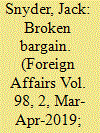

|
|
|
|
|
| Summary/Abstract |
Nationalism and nativism are roiling politics on every continent. With the election of President Donald Trump in the United States, the growing power of right-wing populist parties in Europe, and the ascent of strongmen in states such as China, the Philippines, and Turkey, liberals around the world are struggling to respond to populist nationalism. Today’s nationalists decry the “globalist” liberalism of international institutions. They attack liberal elites as sellouts who care more about foreigners than their fellow citizens. And they promise to put national, rather than global, interests first
|
|
|
|
|
|
|
|
|
|
|
|
|
|
|
|
| 5 |
ID:
110538


|
|
|
|
|
| Publication |
2011.
|
| Summary/Abstract |
A large literature in political science takes for granted that democratic leaders would pay substantial domestic political costs for failing to carry out the public threats they make in international crises, and consequently that making threats substantially enhances their leverage in crisis bargaining. And yet proponents of this audience costs theory have presented very little evidence that this causal mechanism actually operates in real-as opposed to simulated-crises. We look for such evidence in post-1945 crises and find hardly any. Audience cost mechanisms are rare because (1) leaders see unambiguously committing threats as imprudent, (2) domestic audiences care more about policy substance than about consistency between the leader's words and deeds, (3) domestic audiences care about their country's reputation for resolve and national honor independent of whether the leader has issued an explicit threat, and (4) authoritarian targets of democratic threats do not perceive audience costs dynamics in the same way that audience costs theorists do. We found domestic audience costs as secondary mechanisms in a few cases where the public already had hawkish preferences before any threats were made.
|
|
|
|
|
|
|
|
|
|
|
|
|
|
|
|
| 6 |
ID:
106344
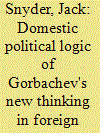

|
|
|
|
|
| Publication |
2011.
|
| Summary/Abstract |
In a chapter, in Myths of Empire (1991), I argued that Gorbachev was seeking to transform atavistic ideas and institutions that had been functional for the initial stage of building socialism, but had become fetters on production and a danger to Soviet security. New concepts of international relations were needed to reduce the dangers and costs of the old confrontational mindset, and also to justify a shift in domestic arrangements away from the military industrial complex, central planning and obsessive secrecy. Together with the international contextual factors that helped to set this process in motion, this domestic political dynamic explains both the peaceful end of the cold war and also the collapse of the Soviet system, which was an unintended byproduct of the democratizing tactics that Gorbachev used to overcome resistance from the old-school military-industrial and ideological elites. These arguments are generally supported by recent accounts of the Soviet collapse and the end of the cold war.
|
|
|
|
|
|
|
|
|
|
|
|
|
|
|
|
| 7 |
ID:
087955


|
|
|
|
|
| Publication |
2009.
|
| Summary/Abstract |
THE OBAMA administration will face human-rights issues at every turn in confronting terrorism, insurgency and ethnic cleansing along the arc of crisis from South Asia to Sudan. To tackle these strategic challenges as well as chronic rights abuses, the new administration and nongovernmental advocacy groups need a new, more pragmatic approach.
In the past, the strategies of neoconservatives and liberal activists have been long on the rhetoric of freedom and rights, but have fallen short on results. Wary of overpromising, the U.S. public has become skeptical about promoting American ideals abroad. Yet the real lesson of these setbacks should not be to abandon idealistic goals, but to pursue them in more pragmatic ways. Without developing a more effective human-rights policy, the United States will neither recover its tarnished reputation nor accomplish its strategic goals.
Some human-rights activists have begun to learn this lesson in their own work. While pronouncements from the headquarters of advocacy organizations still sound doctrinaire, pragmatists in the field are developing eclectic outcome-oriented approaches that take into account the power of local actors and the need to tailor tactics to local circumstances. Both realists and idealists should find value in these effective approaches, which can help restore America's political standing in the world while also doing good.
|
|
|
|
|
|
|
|
|
|
|
|
|
|
|
|
| 8 |
ID:
085934


|
|
|
|
|
| Publication |
2009.
|
| Summary/Abstract |
Why did America invade Iraq? The glib answer is "because it could." In the unipolar moment the immediate costs and risks
of using military force against Saddam Hussein's hollow, troublesome regime seemed low to U.S. leaders.
|
|
|
|
|
|
|
|
|
|
|
|
|
|
|
|
| 9 |
ID:
048401
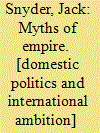

|
|
|
|
|
| Publication |
Ithaca, Cornell University Press, 1991.
|
| Description |
viii, 330p.
|
| Series |
Cornell studies in security affairs
|
| Standard Number |
0801425328
|
|
|
|
|
|
|
|
|
|
|
|
Copies: C:1/I:0,R:0,Q:0
Circulation
| Accession# | Call# | Current Location | Status | Policy | Location |
| 041298 | 325.32/SNY 041298 | Main | On Shelf | General | |
|
|
|
|
| 10 |
ID:
057794
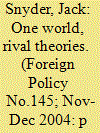

|
|
|
|
|
| Publication |
Nov-Dec 2004.
|
|
|
|
|
|
|
|
|
|
|
|
|
|
|
|
| 11 |
ID:
072025


|
|
|
| 12 |
ID:
141561


|
|
|
|
|
| Summary/Abstract |
When the Berlin-based group Transparency International released its annual ranking of international corruption levels in December 2014, China’s Ministry of Foreign Affairs responded with a blistering statement. Chinese authorities were upset that their country had sunk from 80th to 100th place on the watchdog’s influential Corruption Perceptions Index, even though Beijing was pursuing a high-profile anticorruption campaign . “As a fairly influential international organization,” a Chinese Foreign Ministry spokesperson said , “Transparency International should seriously examine the objectiveness and impartiality of its Corruption Perceptions Index.”
|
|
|
|
|
|
|
|
|
|
|
|
|
|
|
|
| 13 |
ID:
143225


|
|
|
|
|
| Summary/Abstract |
Whether economic interdependence is a cause of war or peace constitutes a central debate in international politics. Two major approaches advance diametrically opposed claims: liberal theory holds that interdependence between states promotes peace by increasing the costs of war; realist theory argues that interdependence is just another word for vulnerability, a condition that states may try to escape by seizing the resources and markets they need for self-sufficiency. Considerable evidence supports both of these claims. In Economic Interdependence and War, Dale Copeland proposes to resolve this stalemate by showing that interdependence promotes peace when states expect mutually beneficial trade to continue, but creates incentives for war when at least one of the states expects that trade trends will leave it dangerously vulnerable. Notwithstanding this book's major theoretical contributions and its impressive historical research, it leaves open several important questions about how to move forward with its agenda of theoretical development and testing.
|
|
|
|
|
|
|
|
|
|
|
|
|
|
|
|
| 14 |
ID:
050841


|
|
|
|
|
| Publication |
Winter 2003-04.
|
|
|
|
|
|
|
|
|
|
|
|
|
|
|
|
|
|
|
|
|